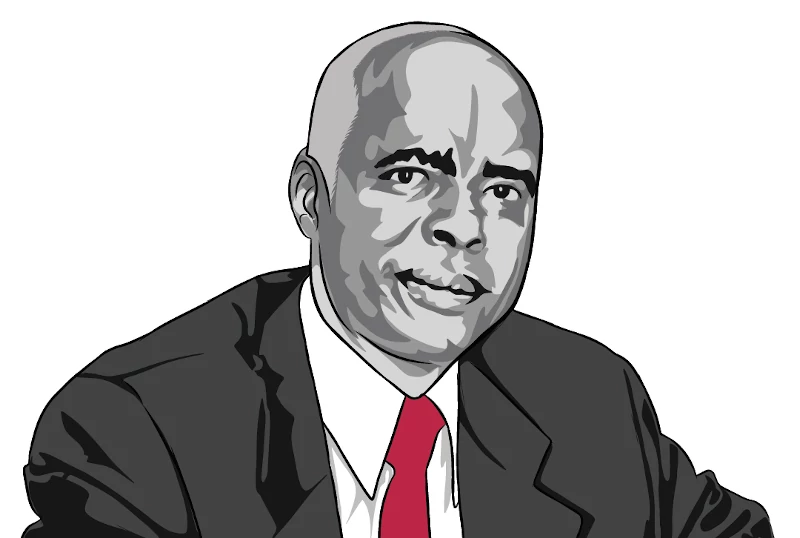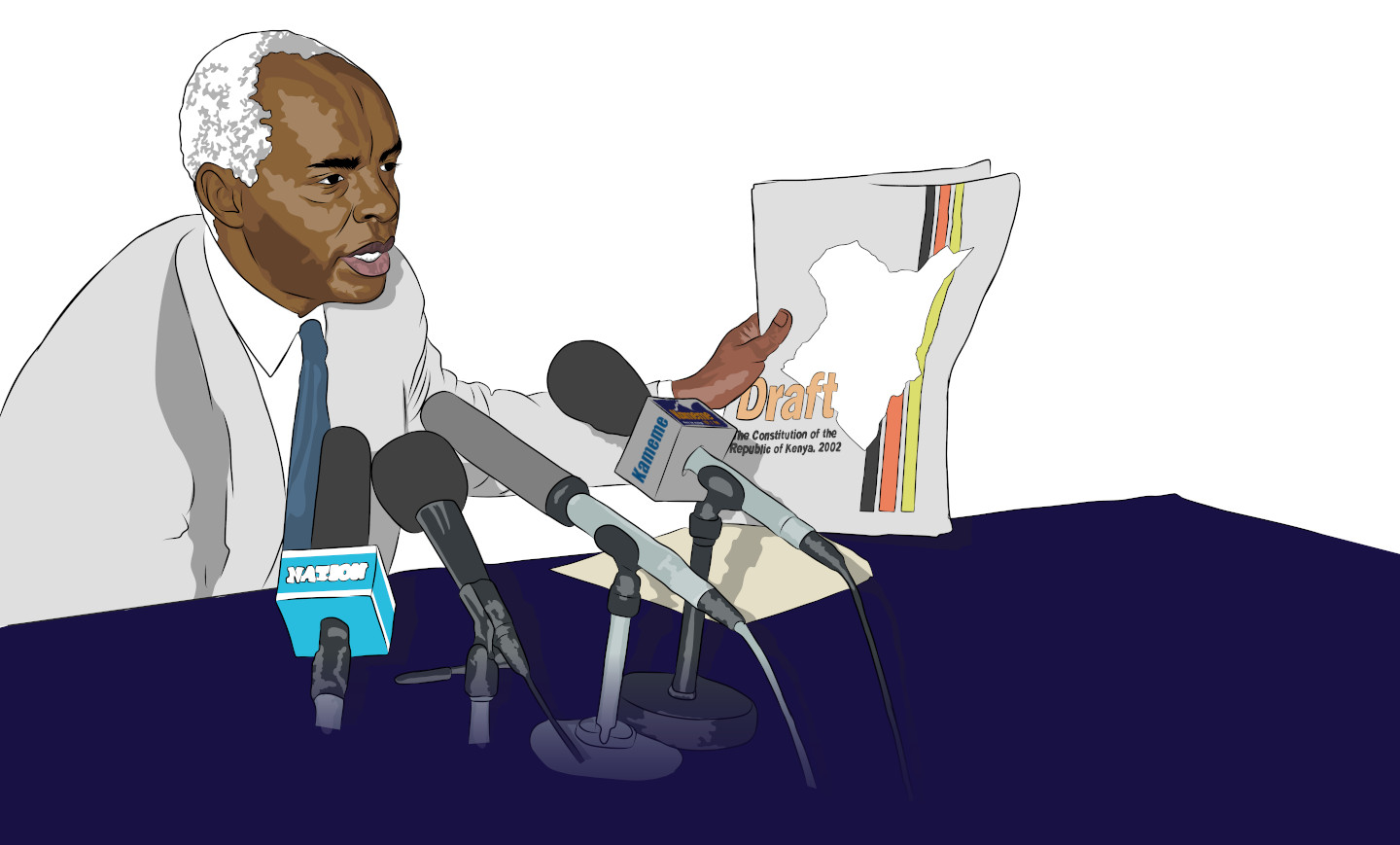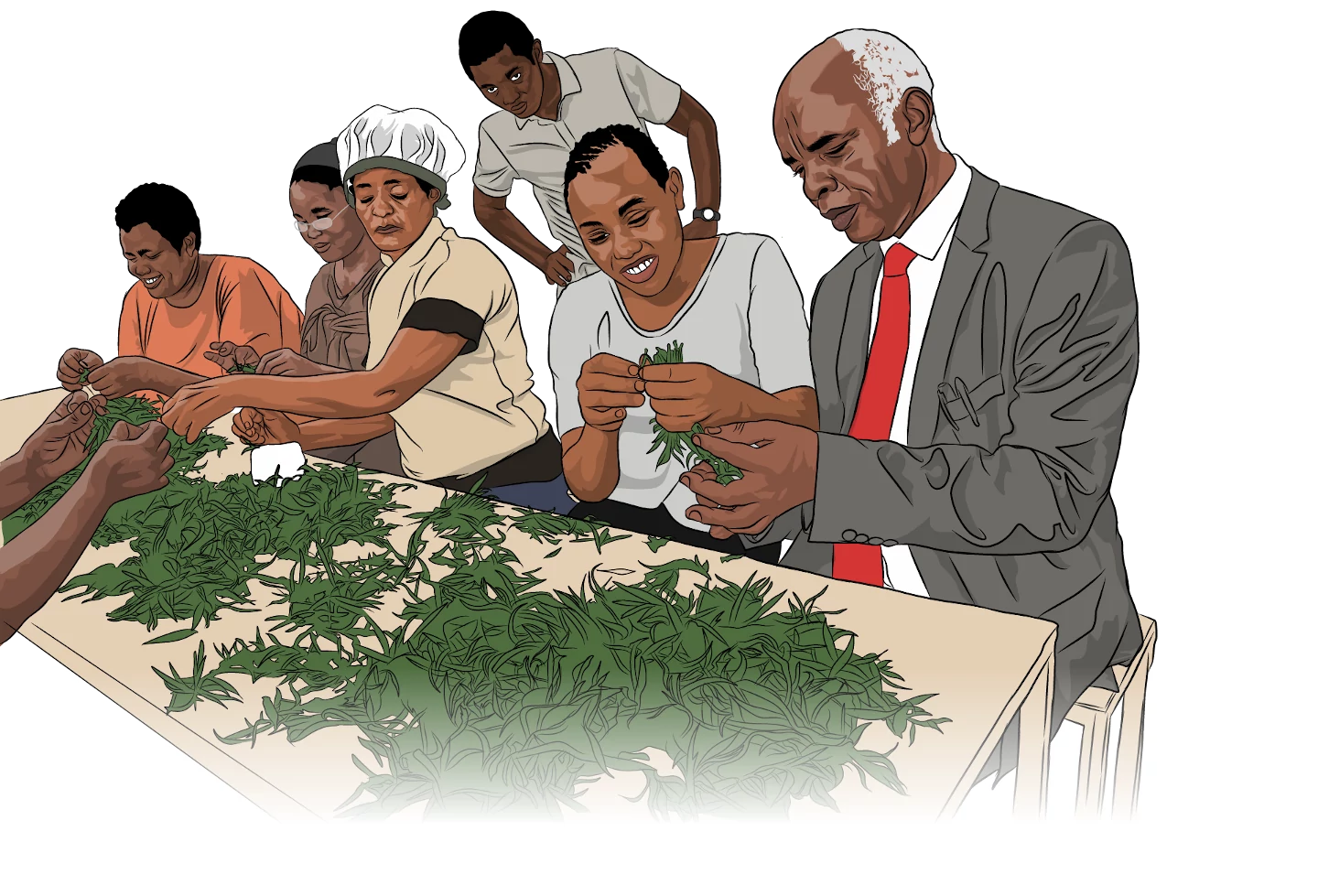For Kivutha Kibwana, leaving Kenya and going to study at Harvard in 1983 was an act of God. Around that time, going all the way to 1988 when Kibwana returned after earning his doctorate in Constitutional Law from George Washington University, a number of Kibwana’s comrades had either fled the country, been detained or died from state-inflicted complications.
By the time Kibwana was leaving Kenya, his teacher and mentor Willy Mutunga was already a guest of the state, an indication that were Kibwana to hang around Nairobi longer, then he too would have found himself cooling his heels in one of the state’s detention dungeons. And it wasn’t that Kibwana and others were looking for trouble. The state, too, was provoking them.
‘‘Before I left for the University of London,’’ Kibwana says, ‘‘the management at the University of Nairobi had asked us to become members of KANU, and I remember saying an emphatic no! We were even enticed that we didn’t have to pay cash for the party membership, that it would be deducted from our salaries. I said I’d rather get kicked out of the university than join KANU.’’
These were the sorts of circumstances Kibwana left behind when he took off to Harvard, where Mutunga tells me initially, Kibwana had one too many drinks before he totally abandoned the bottle as he set off for his PhD. ‘‘The road from Harvard to George Washington compares very well with Paul’s road to Damascus,’’ Mutunga says. It is possibly during this Harvard-George Washington Damascene moment that Kibwana had an epiphany of just what a hard task lay ahead of him in the liberation of Kenya, because Kibwana’s PhD in Constitutional Law became one of the cornerstones in the clamor for and eventual realization of Kenya’s second republic.
‘‘I came back to Kenya in 1988, at a time when Mikhail Gorbachev’s perestroika was in top gear, a year before the fall of the Berlin Wall,’’ Kibwana says. ‘‘The Cold War was quickly dying down, with countries such as the UK, the US and others which had previously supported certain African despots changing tact and abandoning most of them. Time was ripe to push for change.’’
Kibwana re-took his teaching job at the University of Nairobi, by which time Willy Mutunga had been sacked post-detention, alongside other enemies of the state such as Ngugi wa Thiong’o. As the country’s political opposition was coalescing around what would eventually become FORD and was hurtling towards the repeal of Section 2(a) and consequently the 1992 multiparty elections, Kibwana moved quietly to establish a base, networks and structures upon which the change movement would find its footing and anchor itself in playing the looming long game.
‘‘President Moi and his men thought we were busy bodies wasting time holding symposia and conferences in hotels,’’ Kibwana says, ‘‘but the strategy was that first we had to understand the issues, then prepare material, then used that material to spark conversation, before attacking.’’
There was a formula to the madness.
‘‘After Kibwana’s return, we joined forces in the embryonic human rights movement,’’ Mutunga says, ‘‘with him and others setting up the Center for Law and Research International (CLARION) and I and others setting up the Kenya Human Rights Commission (KHRC).’’ Among those who worked with Kibwana at CLARION were Supreme Court Justice Dr. Smokin Wanjala, former Kenya National Commission on Human Rights (KNCHR) Commissioner Lawrence Mute, former Director of the University of Nairobi’s Institute for Development Studies (IDS) Prof. Winnie Mitullah, the late Prof. Symonds Kichamu Akivaga and Prof. Karuti Kanyinga.
‘‘We had a lot of conferences discussing what a new Kenya could look like, what the constitution of such a country would be,’’ Kibwana says, ‘‘and here my PhD in Constitutional Law came in handy because a lot of the things we wrote with the likes of Smokin, Akivaga, Kimondo, Mute, Karuti, Mitula and many others fed into what eventually became the 2010 Constitution.’’
Kibwana says he progressively linked up with various courageous clergymen - Rev. Timothy Njoya, Bishop Henry Okullu, Archbishop Manases Kuria, Archbishop David Gitari, Archbishop Ndingi Mwan a’Nzeki, among others, in seeking to use churches as one of the frontlines for expanding political consciousness. But beyond the church,Kibwana had an Africa-wide network of scholars and thinkers; Adama Dieng from Senegal, Joe Oloka Onyango from Uganda, Issa Shivji from Tanzania, among others whom he met as an external examiner in a number of African universities. Through this group, Kibwana sharpened his ideas of what a new Kenya would look like in the course of their reimagining Africa’s future in the world.
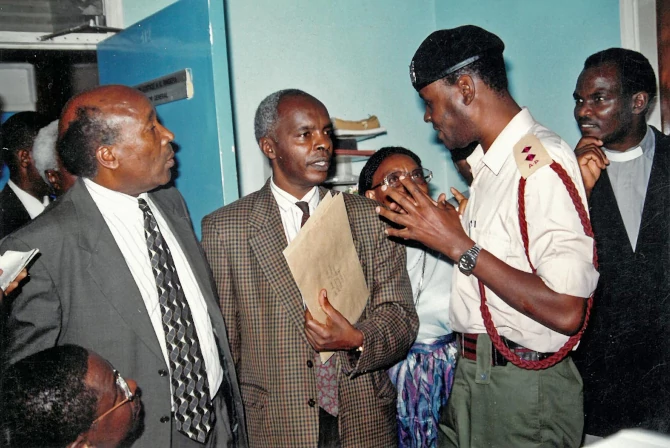
It is this civic, political, intellectual and spiritual momentum that culminated in the National Constituent Assembly (NCA) and the National Convention Executive Council (NCEC), of which Kibwana became spokesman. The NCA and the NCEC became convenors of the civil society, the religious sector, the political opposition in parliament, and citizens - Wanjiku in Moi’s lexicon.
‘‘From 1996 to 1998, through the NCA-NCEC, Kibwana and I, and many others, got involved in various social movements that demanded the writing of a new Constitution,’’ Mutunga says. ‘‘We teamed up with opposition political parties and achieved a lot in the project, first the piecemeal constitutional and legal reforms followed by agitations that gave birth to two parallel parliamentary (precursor to the Constitution of Kenya Review Commission - CKRC) and civil society (Ufungamano Initiative) constitution-making processes. Prof. Yash Pal Ghai succeeded in unifying both initiatives into the CKRC, and the rest is history.’’
Throughout this period, Kibwana had become more visible and outspoken.
‘‘During those NCEC days,’’ Kibwana says, ‘‘we were under serious state surveillance, including being approached by emissaries sent by President Moi. One time Mzee Mulu Mutisya was asked to look for me and take me to State House - I respected him as an elder because that’s what you are taught in those folklore sessions - and so I listened to him as he told me, ‘‘Why don’t you go and see the President and tell him what you guys want?’’ I told him that I can’t go on my own because there was nothing I could discuss with the President on my own, but that if the President wanted to hear us out then we had to meet him as the whole NCEC.’’
Mulu Mutisya couldn’t believe what a tough nut to crack Kibwana was.
‘‘After he failed to convince me to go and meet Moi,’’ Kibwana says, ‘‘Mulu Mutisya told me my mother must have taken the Mau Mau oath - some of the people from Ukambani were in Mau Mau - and that I must have suckled milk which had the oath in it, because I was stubborn.’’ And when Mulu Mutisya offered to give Kibwana money for transport after their meeting, Kibwana asked him to instead give the money to the friend who had given Kibwana a lift to the meeting, someone Mulu Mutisya respected. Mulu Mutisya was dumbfounded. ‘‘As much as people say he was uneducated and so on,’’ Kibwana says, ‘‘Mulu Mutisya was a leader worth his salt unlike a lot of leaders today. He did not bulldoze his way even when you didn’t agree with him or fancy himself as being better than others. I respected that about him.’’
After Mulu Mutisya failed, a senior Kamba intelligence officer was sent to Kibwana.
‘‘The spy came to persuade me to go and meet President Moi,’’ Kibwana says, ‘‘telling me they had looked at my bank accounts - they weren’t many - and seen there wasn't any money there. The offer was that if I agreed to go and meet the President, I would be given money, which could be sent overseas from where I could go and pick it. I told the man yes, I will take the money but only on condition that every Kenyan was going to be given money.’’ Kibwana chuckles.
Then there were the physical attacks, economic sabotage, and so on, but Kibwana soldiered on.
‘‘During the mass action in 1997 (May, June, July, August, September and October) Kibwana organically became the Spokesperson of the NCA-NCEC. The politicians in the movement did not trust each other for any one of them to undertake that role,’’ Mutunga says. ‘‘Kibwana had emerged as our overall leader in the same manner James Orengo had emerged as our leader in press conferences and on the streets. Kibwana’s leadership grew in stature and his name featured prominently alongside that of Moi.’’
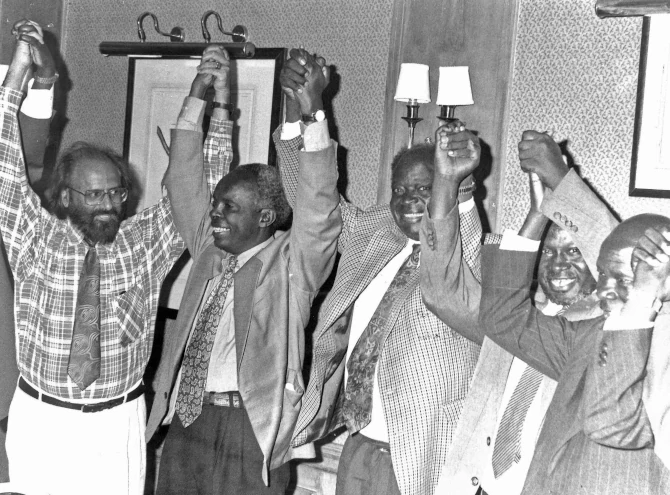
As the 1997 general election approached, some members of the broad coalition encompassing the civil society, the religious groups and the political opposition started getting jittery. The parliamentary opposition parties were divided as ever, meaning President Moi would easily win re-election unless a unity pact was crafted. There were also fears that unless some form of reforms were done, the elections wouldn’t be free and fair due to state interference at all stages and levels. It is with this backdrop that the Inter Parties Parliamentary Group (IPPG) was born, to try and enact a set of minimum electoral and other reforms before the 1997 general election.
Around that time, Kibwana, Mutunga and other vanguards of the NCA-NCEC used to meet every week with leaders of parliamentary opposition parties including Raila Odinga and Mwai Kibaki, alongside progressives such as Martha Karua, James Orengo and Anyang’ Nyong’o. The idea had always been that the group would either stick together or split up and get hanged separately, and the IPPG process became a mini-point of departure. By this time, in the public eye, it was the likes of Kibwana who were leading the movement, while politicians played second fiddle.
‘‘There was a huge debate as to whether we should support piecemeal reforms or push for comprehensive reforms as originally intended,’’ Kibwana says, ‘‘and I totally understood where proponents of comprehensive reforms were coming from. A lot of lives had been lost, a lot of comrades had been maimed and imprisoned, and so on, and so there was a sense that the price paid that far was so high for us to settle for less. We had to finish the job, not do half a job.’’
But then elements within the Moi state saw an opportunity.
‘‘Nicholas Biwott played a key role in urging our political friends to abandon us,’’ Kibwana says, ‘‘telling them how could they be subservient to us, unelected individuals. But Mutunga would say, if you have a good idea then that’s enough. You don’t have to be elected. All you need to do is to sell the idea to the masses.’’
A divide emerged. The politicians went for IPPG, with the promise that they could appoint a few commissioners of their choice to sit in the Electoral Commission of Kenya (ECK), among other goodies. The civil society group felt betrayed, and expressed as much to their political friends. However, looking back, Kibwana thinks they should have supported the IPPG. In later years, Kibwana found it difficult convincing Zimbabwe’s Morgan Tsvangirai to accept piecemeal reforms as a tactic, because like him in 1997, Tsvangirai wanted everything or nothing. That is how Zimbabwe missed a window for minimum reforms. Luckily for Kibwana, Kenya’s constitution making story had what they imagined was a happy ending. But beyond their pursuit for reforms, the opposition needed to unite or perish.
‘‘There was always the issue of the leaders of the opposition never agreeing on one presidential flag bearer, and that is how Kibwana’s name came up as an obvious alternative,’’ Mutunga says. ‘‘I do not recall this issue being discussed formally in the NCA-NCEC. Indeed, it is my belief that the opposition political parties feared this people-driven demand for one presidential candidate from the opposition. This may explain why they trooped out of NCA-NCEC to join in the IPPG initiative, which Moi brilliantly managed resulting in his victory in 1997.’’
Kibwana confirms that indeed all the opposition leaders were in on his candidature.
‘‘I had played a leading role in the conversations on what a new Kenya would look like, and also worked closely with donors who trusted me in terms of identifying credible groups which could be funded in order to assist the democratization process,’’ Kibwana says. ‘‘These, and other factors must have contributed to the opposition approaching me to be their compromise candidate. But we were committed to having a new constitution, and so the solution wasn’t just getting a new leadership. Because fundamentally, if you don’t change the rules even new players will find it hard to play. It is for this reason that I declined the offer.’’ Kibwana was 43.
On his part, Mutunga thinks Kibwana should have taken the offer and run.
‘‘After the IPPG was formed, some radical elements within the NCA-NCEC were of the view that it was a great opportunity for civil society to form a party and contest the 1997 presidential election seeing that the parliamentary opposition had bolted,’’ Mutunga says. ‘‘There was no consensus and I do not recall us getting to implement the idea. If that had happened, we clearly had a candidate in Kibwana. Looking back, we missed a great opportunity to start a movement for alternative political leadership which is currently a burning political question in Kenya.’’
Does Kibwana have any regrets? None whatsoever.
It was under these circumstances that towards the 2002 general election, Mutunga played the leading role in uniting three opposition stalwarts, Charity Ngilu, Mwai Kibaki and Michael Kijana Wamalwa to form the nucleus of what became the united opposition behemoth which dislodged independence party KANU from power. At this point, Kibwana decided it was time he followed the constitution making process to parliament, since the promise of the united opposition was that once they took power, a new constitution was high up in their priority list. But as Kibwana and others rushed into government, they left behind a burning house.
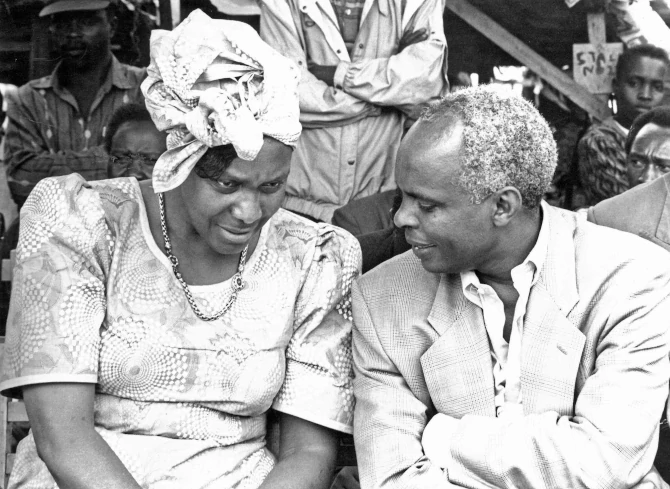
‘‘We did not have a well thought out succession plan within the civil society,’’ Kibwana says, ‘‘and so a lot of things went haywire, partly due to lack of funding. We had not thought of sustainability, and donors were saying because we had a democratic government in place, they now wanted to fund its programs. It was as if the revolution was over.’’
That wasn’t all.
‘‘A lot of the younger cadres within the civil society thought those of us who went into politics and government were betrayers,’’ Kibwana says. ‘‘I remember Mutunga trying to talk about high politics, where even this group of reformers needed to find a foothold in the politics of the day so that they could influence the implementation of whatever change had occurred, but that idea was shot down and we were counted as betrayers. In 1997, we had called the political opposition betrayers for going back to parliament to join the IPPG. In 2002, myself and others were now the new betrayers. Unfortunately, there was no structured collaboration between those of us in government and those outside, and in the end, the civil society found itself isolated, in a Siberia of sorts.’’
But currently, Kibwana says, there is a renaissance.
‘‘We had imagined that passing a constitution was enough,’’ Kibwana says, ‘‘but it wasn’t.’’
